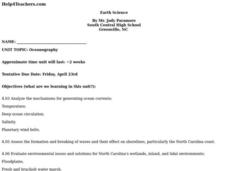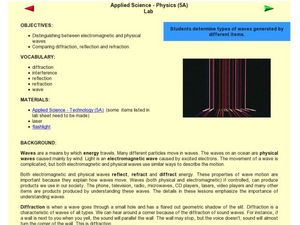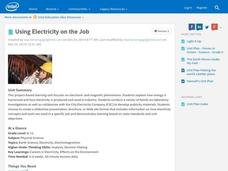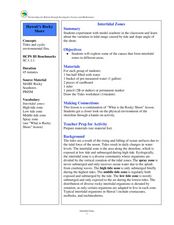Curated OER
Wave Math
Students identify the different factors affecting the size and shape of ocean waves. In this math lesson, students calculate wave speed and wavelength given a mathematical formula.
Curated OER
Catch a Wave
Young scholars study low tides and how to calculate for fresh water. In this ocean science activity, students pretend they are stranded on an island and must calculate low tide in order to source the fresh water aquifer. Young scholars...
Curated OER
Wonderful Waves - Ocean Waves and Erosion
Students examine how waves are generated by wind, create a model that uses wind to create waves and conduct an experiment that demonstrates the effect that waves have on the coastline.
Curated OER
Earth Science
High schoolers analyze the mechanisms for generating ocean currents, temperature, and deep ocean circulation. They are able to assess the formation and breaking of waves and their effect on shorelines, particularly the North Carolina...
Curated OER
Electromagnetic and Physical Waves
Students compare and contrast electromagnetic and physical waves. In this wave lesson, students discover that all waves reflect, refract, and diffract energy. Students work in small groups to experiment with waves and evaluate the type...
Google
Adventure on the High Seas
Ahoy there! A fun computer science lesson challenges pupils to write a program that creates an ocean wave. They then develop stories to accompany their projects. All of this takes place within the Scratch coding program.
Curated OER
Oceanic Heat Budget Activities
Young scholars map and research imaginary islands located in different parts of the world. They describe the weather and climate of their island and show how local currents, water temperatures and waves may influence the weather patterns.
Curated OER
Wave Erosion Lesson
Fourth graders examine the effects of waves as they erode coastal land. They discover how the power of water can change the appearance of land formations.
Curated OER
Checking the Surf
Learners read and discuss waves and their wavelengths and amplitudes. In this waves lesson plan, students draw the wavelength and amplitude of a wave and discuss tsunamis and storms.
Curated OER
Ocean Power
Students explore the energy resources of the ocean. In this energy lesson, students participate in 4 activities focused on energy resources from the ocean.
Curated OER
Regolith Formation
Students explain the difference between regolith formation on Earth and the Moon. In this space science lesson plan, students model the different factors affecting regolith formation on Earth. They identify the different types of...
Curated OER
Tsunami
Students explore tsunami through various hands-on activities. In this earth science lesson, students explain how they are formed. They create tsunami and earthquake models in the lab to observe how they are generated.
Curated OER
The Science of Weather: Hurricanes
Students use this USA today activity to learn about hurricane season. For this hurricane lesson, students study the map of the earth and hurricane science. Students complete discuss questions. Students draw a map of the United States and...
Curated OER
Amazon Water Cycle Role Play
Students participate in a role play where they play clouds, the ocean, rain drops, and more in order to learn about the water cycle. For this water cycle lesson plan, students have discussions and learn vocabulary.
Curated OER
Conditions at Sea Data Activity
Students study how to forecast sea conditions. In this oceanography lesson students complete a class activity on wave making.
Curated OER
Hurricanes
Students perform various experiments to explore hurricanes. In this earth science lesson, students explain how they form. They identify the structure of a hurricane.
Curated OER
Earthquake Experiments
Students discuss the effects of earthquakes. For this earth science lesson, students create earthquake models and earthquake-proof buildings. They construct their own seismograph.
Curated OER
The Magic School Bus Goes to Mussel Beach
Students investigate tides and create a model of an intertidal zone. In this hands-on marine science lesson based on a Magic School Bus book, the teacher leads students in a discussion about tides, then helps students model a tide and...
Intel
Using Electricity on the Job
Learners explore electricity, discussing its importance and researching different ways in which electricity can be generated. Groups present their findings to the class and then create publicity materials which promote and educate about...
Curated OER
Aquatic Ecosystems
Ninth graders record information on aquatic ecosystems and create a labeled diagram of an ecosystem of their choice. They can choose from an ocean zone, estuary, river, lakes, or beaches. The student has to explain their biome of choice.
Curated OER
Oceans and Weather
Pupils analyze the impact the ocean and its currents have on weather. In this oceans and weather lesson, students analyze data comparing inland and coastal weather, and analyze satellite data for evidence of El Nino.
Curated OER
Invent an Invertebrate
Design a new organism with recyclable art materials! After learning about the coastal biome, learners brainstorm challenges that a plant or animal may face. They use their ideas to create a creature, complete with environmental...
Curated OER
Intertidal Zones
Students explore intertidal zones. In this intertidal zones lesson plan, students work in small groups and use ready-made materials to create a model of intertidal zones. Resources are provided.
Curated OER
Earthquake Proof Structures
Eighth graders build a structure that is able to withstand a simulated earthquake. They research earthquakes, earthquake measurement, and society's preparation for and reaction to them. Pupils build models and present them to the...























